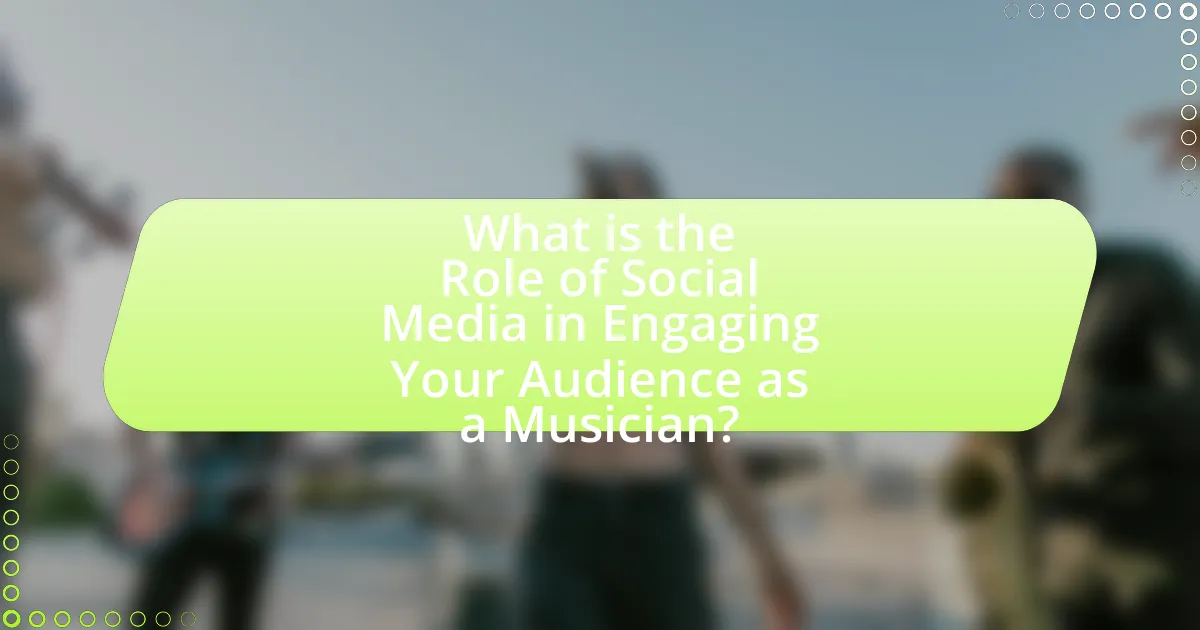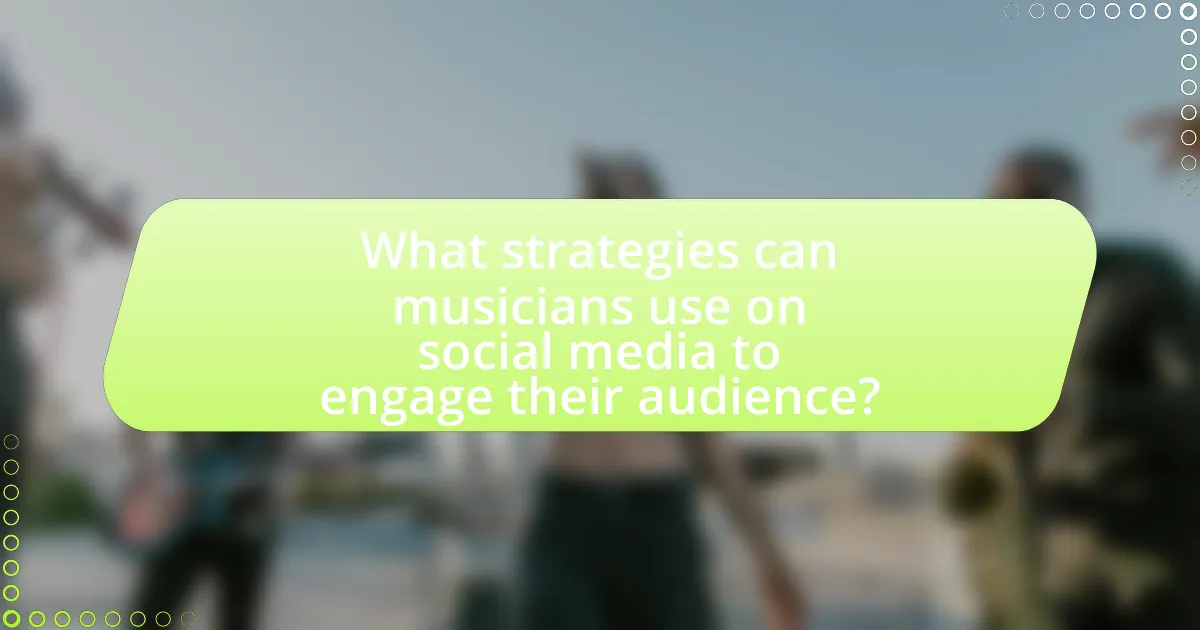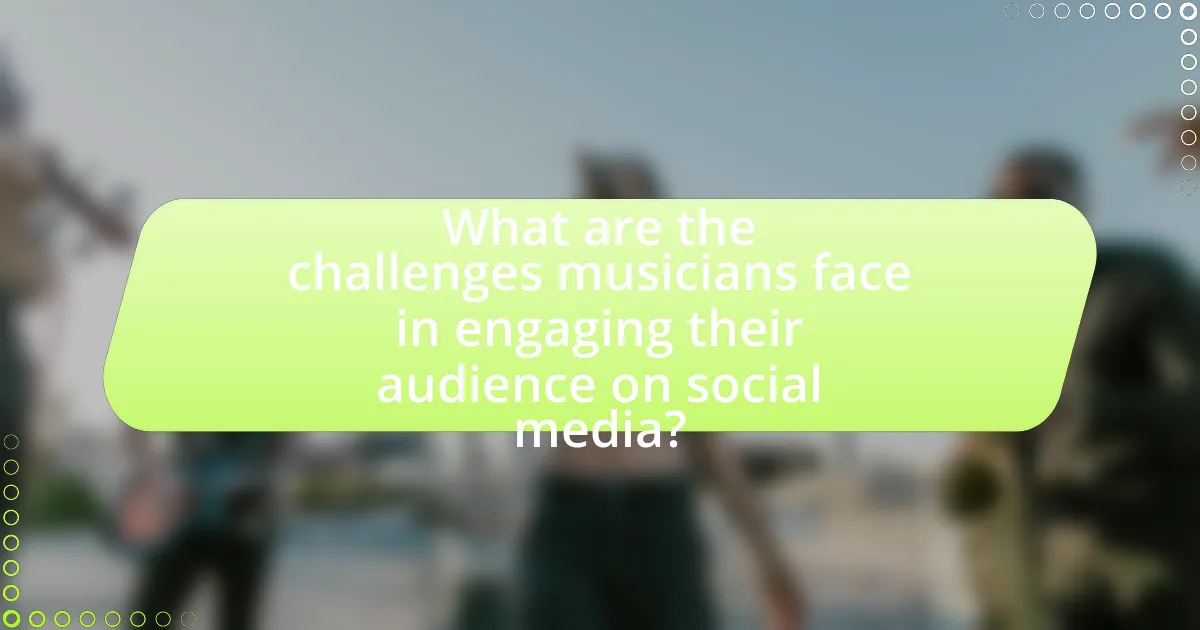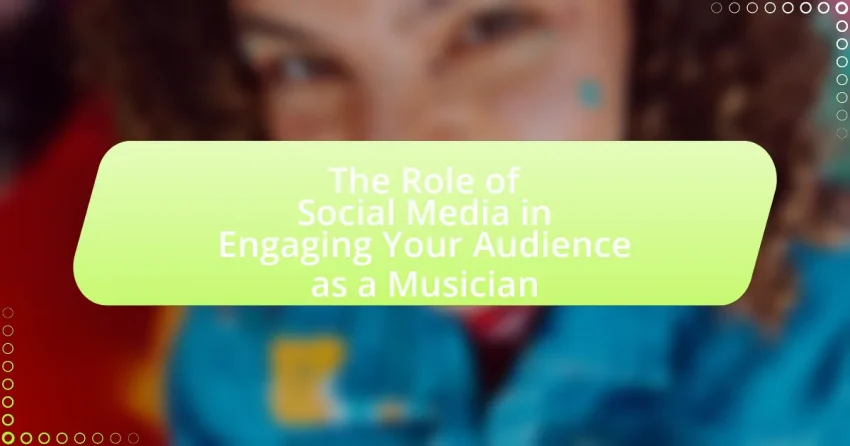The article examines the critical role of social media in engaging audiences for musicians. It highlights how platforms like Instagram, TikTok, and Facebook facilitate direct interaction, content sharing, and community building, significantly impacting audience engagement and loyalty. Key strategies for musicians include creating compelling content, utilizing storytelling, and responding to fan interactions, which enhance visibility and foster a loyal fan base. The article also addresses challenges musicians face in a saturated digital landscape and offers best practices for maintaining authenticity while promoting their work. Overall, it underscores the importance of effective social media engagement in a musician’s career success.

What is the Role of Social Media in Engaging Your Audience as a Musician?
Social media plays a crucial role in engaging an audience for musicians by providing a platform for direct interaction and content sharing. Musicians can use social media to promote their music, share behind-the-scenes content, and connect with fans in real-time, fostering a sense of community. According to a 2021 survey by the International Federation of the Phonographic Industry, 75% of music listeners discover new music through social media platforms, highlighting their effectiveness in audience engagement. Additionally, platforms like Instagram and TikTok allow musicians to create viral content, further expanding their reach and influence.
How does social media influence audience engagement for musicians?
Social media significantly enhances audience engagement for musicians by providing direct communication channels and interactive platforms. Musicians can share content such as music videos, live performances, and personal updates, fostering a sense of community and connection with fans. According to a study by the Pew Research Center, 72% of adults use social media, which allows musicians to reach a broad audience and engage with them in real-time. This engagement is further amplified through features like comments, shares, and live streaming, which encourage fan participation and feedback. Additionally, platforms like Instagram and TikTok have algorithms that promote viral content, enabling musicians to gain visibility and attract new listeners quickly.
What are the key social media platforms used by musicians?
Musicians primarily use Instagram, Facebook, Twitter, TikTok, and YouTube as key social media platforms. Instagram is favored for its visual content, allowing musicians to share photos and short videos, while Facebook provides a broader audience reach and event promotion capabilities. Twitter is utilized for real-time updates and engagement with fans, TikTok has gained popularity for its viral music trends and challenges, and YouTube serves as a platform for music videos and longer content. According to a 2021 survey by the Music Industry Research Association, over 70% of musicians reported using Instagram as their main platform for fan engagement, highlighting its significance in the music industry.
How do musicians utilize these platforms to connect with fans?
Musicians utilize social media platforms to connect with fans by sharing content, engaging in direct communication, and promoting their music. For instance, artists frequently post updates, behind-the-scenes footage, and personal stories, which fosters a sense of intimacy and community among their followers. According to a 2021 survey by the International Federation of the Phonographic Industry, 70% of music fans reported that they follow artists on social media to feel closer to them. This direct interaction allows musicians to receive immediate feedback, build loyalty, and create a more engaged fan base.
Why is audience engagement important for musicians?
Audience engagement is crucial for musicians because it fosters a loyal fan base and enhances visibility in a competitive industry. Engaged audiences are more likely to attend concerts, purchase merchandise, and share music, which directly contributes to a musician’s success. According to a study by the Music Industry Research Association, musicians who actively engage with their audience on social media platforms see a 30% increase in fan interaction and a 25% increase in concert attendance. This demonstrates that effective audience engagement not only strengthens relationships but also translates into tangible benefits for musicians.
What impact does audience engagement have on a musician’s career?
Audience engagement significantly enhances a musician’s career by fostering a loyal fan base and increasing visibility. Engaged audiences are more likely to attend concerts, purchase merchandise, and share music, which directly contributes to a musician’s revenue and popularity. For instance, a study by the University of Southern California found that musicians with higher social media engagement experienced a 30% increase in concert attendance and a 25% boost in album sales. This demonstrates that active interaction with fans not only strengthens relationships but also translates into tangible career benefits.
How does engagement lead to increased fan loyalty?
Engagement leads to increased fan loyalty by fostering a sense of community and connection between musicians and their audience. When musicians actively interact with fans through social media, they create opportunities for fans to feel valued and heard, which enhances emotional investment. Research indicates that 70% of fans are more likely to remain loyal to artists who engage with them regularly on social platforms. This consistent interaction not only strengthens the bond but also encourages fans to advocate for the artist, further solidifying their loyalty.

What strategies can musicians use on social media to engage their audience?
Musicians can engage their audience on social media by utilizing interactive content, such as live Q&A sessions, polls, and behind-the-scenes footage. These strategies foster a sense of community and personal connection, which is crucial for audience engagement. For instance, a study by the Pew Research Center found that 69% of adults in the U.S. use social media, indicating a vast potential audience for musicians to connect with. Additionally, musicians can leverage user-generated content by encouraging fans to share their experiences or covers, which not only increases engagement but also enhances the musicians’ visibility.
How can musicians create compelling content for their audience?
Musicians can create compelling content for their audience by leveraging storytelling, engaging visuals, and interactive elements. Storytelling allows musicians to connect emotionally with their audience, making their music more relatable and memorable. Engaging visuals, such as high-quality images and videos, enhance the overall experience and attract attention on social media platforms. Interactive elements, like polls, Q&A sessions, and live performances, foster a sense of community and encourage audience participation. Research indicates that posts with visuals receive 94% more views than text-only posts, highlighting the importance of visual content in capturing audience interest.
What types of content resonate most with music fans?
Music fans resonate most with content that includes behind-the-scenes footage, live performances, and personal stories from artists. Research indicates that 70% of fans prefer authentic content that provides insight into the artist’s life and creative process, as it fosters a deeper connection. Additionally, interactive content such as polls, Q&A sessions, and fan challenges significantly boosts engagement, with studies showing that posts featuring direct fan interaction receive 50% more comments and shares.
How can storytelling enhance a musician’s social media presence?
Storytelling can enhance a musician’s social media presence by creating a deeper emotional connection with the audience. When musicians share personal narratives, experiences, or the inspiration behind their music, they foster relatability and authenticity, which can lead to increased engagement. For instance, a study by the University of Southern California found that storytelling in marketing can increase audience retention by up to 65%, demonstrating its effectiveness in capturing attention. This emotional engagement encourages followers to share content, participate in discussions, and develop a loyal fan base, ultimately amplifying the musician’s reach and impact on social media platforms.
What role does interaction play in audience engagement?
Interaction is crucial for audience engagement as it fosters a sense of community and connection between the musician and their audience. Engaging directly with fans through comments, live sessions, and social media posts enhances emotional investment, leading to increased loyalty and support. Research indicates that 70% of consumers feel more connected to brands when they can interact with them, highlighting the importance of interaction in building relationships. This connection not only encourages audience participation but also amplifies the reach of the musician’s content, as engaged audiences are more likely to share and promote the artist’s work.
How can musicians effectively respond to fan comments and messages?
Musicians can effectively respond to fan comments and messages by prioritizing timely and authentic engagement. Timely responses show fans that their input is valued, which can enhance loyalty and connection. Authenticity in replies fosters a genuine relationship, making fans feel appreciated and heard. Research indicates that musicians who engage with their audience on social media platforms can increase their fan base and improve overall engagement metrics. For instance, a study by the University of Southern California found that artists who actively respond to comments see a 30% increase in fan interaction. This demonstrates that effective communication strategies can significantly impact a musician’s relationship with their audience.
What are the benefits of hosting live sessions or Q&As?
Hosting live sessions or Q&As enhances audience engagement by fostering real-time interaction and building a sense of community. These sessions allow musicians to connect directly with their fans, answer questions, and receive immediate feedback, which can strengthen relationships and loyalty. According to a study by the Pew Research Center, 54% of social media users engage with live content, indicating a strong preference for interactive formats. This engagement can lead to increased visibility and reach, as live sessions often attract more viewers than pre-recorded content, amplifying a musician’s presence on social media platforms.

What are the challenges musicians face in engaging their audience on social media?
Musicians face several challenges in engaging their audience on social media, including algorithm changes, content saturation, and audience fragmentation. Algorithm changes on platforms like Instagram and Facebook can limit the visibility of posts, making it difficult for musicians to reach their followers effectively. Content saturation occurs as numerous artists compete for attention, leading to a diluted impact of individual posts. Additionally, audience fragmentation means that musicians must tailor their content to diverse demographics across various platforms, complicating their engagement strategies. These factors collectively hinder musicians’ ability to maintain a consistent and meaningful connection with their audience.
How can musicians overcome the noise of social media saturation?
Musicians can overcome the noise of social media saturation by focusing on authentic engagement and targeted content strategies. By creating genuine connections with their audience through storytelling and personal interactions, musicians can stand out amidst the overwhelming volume of content. Research indicates that posts with personal narratives receive 300% more engagement than standard promotional content, highlighting the effectiveness of authenticity. Additionally, utilizing analytics tools to identify and engage with their most active followers allows musicians to tailor their content, ensuring it resonates with their core audience. This targeted approach not only enhances visibility but also fosters a loyal fan base, making it easier for musicians to navigate the crowded social media landscape.
What strategies can help musicians stand out in a crowded space?
Musicians can stand out in a crowded space by leveraging unique branding, engaging storytelling, and targeted social media strategies. Unique branding involves creating a distinct image and sound that resonates with a specific audience, which can be supported by consistent visual elements across platforms. Engaging storytelling allows musicians to connect emotionally with their audience, sharing personal experiences and insights that enhance relatability. Targeted social media strategies, such as using analytics to identify and engage with niche audiences, can significantly increase visibility. For instance, a study by the Berklee College of Music found that musicians who actively engage with their audience on platforms like Instagram and TikTok see a 30% increase in fan interaction and loyalty.
How can musicians manage negative feedback or criticism online?
Musicians can manage negative feedback or criticism online by adopting a proactive and constructive approach. They should first assess the feedback objectively, distinguishing between constructive criticism that can lead to improvement and unhelpful negativity. Engaging with critics respectfully can demonstrate professionalism and a willingness to grow, which can positively influence their audience’s perception. Additionally, musicians can utilize social media tools to share their perspectives, clarify misunderstandings, or explain their artistic choices, fostering a dialogue rather than a confrontation. Research indicates that artists who actively engage with their audience, even in the face of criticism, can enhance their fan loyalty and community support, as seen in studies on social media engagement in the music industry.
What metrics should musicians track to measure engagement success?
Musicians should track metrics such as follower growth, engagement rate, reach, and conversion rate to measure engagement success. Follower growth indicates the increase in audience size, while engagement rate, calculated by interactions (likes, comments, shares) divided by total followers, reflects how actively the audience interacts with content. Reach measures how many unique users see posts, and conversion rate tracks the percentage of users taking desired actions, such as streaming music or purchasing merchandise. These metrics provide a comprehensive view of audience interaction and effectiveness of social media strategies in engaging fans.
Which key performance indicators are most relevant for musicians?
The key performance indicators most relevant for musicians include engagement rate, follower growth, streaming numbers, and concert ticket sales. Engagement rate measures how actively audiences interact with a musician’s content, indicating the effectiveness of social media strategies. Follower growth tracks the increase in audience size, reflecting the musician’s reach and popularity. Streaming numbers provide insights into how often a musician’s music is played on platforms like Spotify or Apple Music, which is crucial for revenue and visibility. Concert ticket sales directly correlate with a musician’s ability to attract live audiences, serving as a tangible measure of success. These indicators collectively help musicians assess their performance and refine their marketing strategies.
How can data analytics inform a musician’s social media strategy?
Data analytics can inform a musician’s social media strategy by providing insights into audience behavior, engagement patterns, and content performance. By analyzing metrics such as likes, shares, comments, and follower demographics, musicians can tailor their content to better resonate with their audience. For instance, a study by Hootsuite found that posts with videos receive 48% more engagement than those without, indicating that musicians should prioritize video content. Additionally, tools like Google Analytics can track referral traffic from social media to a musician’s website, helping to identify which platforms drive the most traffic and conversions. This data-driven approach allows musicians to optimize their posting schedules, content types, and promotional strategies, ultimately enhancing audience engagement and growth.
What are some best practices for musicians on social media?
Musicians should consistently engage with their audience on social media by posting regularly, responding to comments, and sharing behind-the-scenes content. Regular posting keeps followers informed and interested, while interaction fosters a sense of community. According to a study by the Pew Research Center, 69% of adults in the U.S. use social media, highlighting its importance for reaching a broad audience. Additionally, sharing personal stories and experiences can enhance relatability, as 78% of consumers prefer brands that share authentic content.
How can musicians maintain authenticity while promoting their work?
Musicians can maintain authenticity while promoting their work by staying true to their artistic vision and engaging with their audience in a genuine manner. This involves sharing personal stories, insights into their creative process, and being transparent about their experiences in the music industry. Research indicates that artists who communicate authentically on social media platforms, such as Instagram and Twitter, foster stronger connections with their fans, leading to increased loyalty and support. For instance, a study by the University of Southern California found that musicians who share behind-the-scenes content and personal anecdotes receive higher engagement rates, reinforcing the importance of authenticity in promotional efforts.
What tips can help musicians build a consistent online presence?
Musicians can build a consistent online presence by regularly posting engaging content across multiple social media platforms. Consistency in posting, such as sharing updates, behind-the-scenes footage, and personal stories, helps maintain audience interest and fosters a sense of community. Research indicates that brands, including musicians, that post consistently see a 67% increase in engagement compared to those that do not. Additionally, utilizing analytics tools to track engagement metrics allows musicians to refine their strategies based on audience preferences, further enhancing their online visibility.
